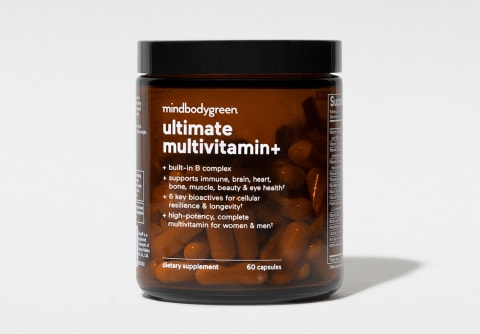Advertisement
Should You Take A Multivitamin? Experts Say Yes — But Focus On These Factors


Ashley Jordan Ferira, Ph.D., RDN is Vice President of Scientific Affairs at mindbodygreen. She received her bachelor's degree in Biological Basis of Behavior from the University of Pennsylvania and Ph.D. in Foods and Nutrition from the University of Georgia.

Ah, yes—the golden question: Should I take a multivitamin? If you've ever pondered this query yourself, you already know the answer isn't so cut-and-dried. And with so many multivitamins on the market, how do you even choose one once you decide you need one? Don't worry, we've got you covered.
What is a multivitamin?
Before we figure out whether you should take a multivitamin, let's define what a multi is, exactly. A multivitamin is a dietary supplement primarily designed to help you meet the daily dietary requirements of vitamins and minerals—many of which are not easily consumed from diet alone. In addition to a complete B complex, a smart multi that is forward-thinking will also deliver key phytonutrients (plant-derived nutrients) from botanicals.
Along with these essential nutrients and phytonutrients, you will also (hopefully) find few inactive ingredients (aka excipients) on the list of multi ingredients. In general, the fewer of these, the better!
Multivitamins come in a variety of forms—including capsules, softgels, tablets, and even liquids, powders, and gummies. As far as choosing the right form goes, there isn't necessarily a superior choice (although we do have some thoughts on gummy multivitamins). Beyond personal preference, it really comes down to how comprehensive is the formula, plus potency, bioavailability, and quality of ingredients—no matter what form they take.
A recap
Why you should consider taking a multivitamin
If you live in the United States, chances are you're not meeting your daily nutritional requirements1 for all micronutrients. In fact, when considering naturally occurring sources (i.e., food that isn't fortified), 40% or more of the American population2 is below the recommended daily needs for eight out of 14 nutrients—including vitamins A, C, D, E, folate, and thiamin.
Isn't it enough of a challenge to ensure you're eating enough fruits and vegetables, let alone all the essential micronutrients? Considering everything else you have on your (metaphorical) plate, achieving nutritional sufficiency each day from food alone is tough—and for certain nutrients, virtually impossible!
Lucky for those of us who are often preoccupied but still care about our nutrition, a 2017 study3 discovered that frequent use of a multi effectively increases micronutrient intakes and decreases the prevalence of most nutrient inadequacies in U.S. adults.* Yes, you read that correctly: Multivitamins are nutritional multitaskers, and taking one daily can help bridge the gap for nutrient insufficiencies.*
Still not sold on nutritional sufficiency alone? mbg's director of scientific affairs, Ashley Jordan Ferira, Ph.D., RDN, shares this additional insight: "Don't underestimate multivitamins to be 'gap fillers.' A new-school multi that considers the latest science is not just useful for addressing daily nutrient gaps from our diet, but it's supporting various aspects of our health, from our bones and brain to immune function, vision, and healthy aging."*
Perhaps these incremental health benefits of taking a multivitamin will change your mind. Indeed, multis support everything from longevity4 and cognition5 to immune health6—not to mention the work that individual nutrients do for your cells, organs, and tissues to keep the body functioning optimally throughout the day.*
The added convenience of a multivitamin is a massive bonus as well—a typical serving of only a couple of pills a day can supplement the micronutrients you may be missing in your meals. It's honestly a no-brainer.
A recap
Are multivitamins worth it?
For certain demographics, a multivitamin can be especially helpful. For example, individuals that follow a vegan or vegetarian diet may struggle to get enough iron, iodine, and vitamin B12 because they've either partially or entirely eliminated animal products from their diet. Finding supplements with a daily dose of vitamins and minerals that are tough to get from plants alone is a simple practice that can help support vegans' and vegetarians' overall health.*
Pregnant women are another group that requires a little extra TLC when it comes to nutritional supplements. Folate, iron, calcium, iodine, vitamin D3, and DHA (one of the three main omega-3 fatty acids) all play an important role in fetal growth and development, which is why prenatal vitamins often focus on these nutrients.* If pregnant women aren't getting all of their daily requirements from food alone, a robustly formulated multivitamin can help bridge that gap to keep both mama and baby happy and healthy.*
RELATED STORY: The 10 Best Multivitamins Of 2023 For Women
Common misconceptions about multivitamins
First and foremost, multivitamins are not a replacement for healthy, balanced meals. (Nobody ever said they were.) That being said, multis are an incredible supplement to an already nutritionally focused diet. If you're looking for a little boost in your nutrients and a big win for whole-body health, a multi is a great tool!*
Let's also address the idea that high-quality multivitamins don't do anything beneficial (because that's just ridiculous). Just like any supplement, the degree of value completely depends on the scientific evidence, quality, potency (dose), and bioavailability of its ingredients.
According to board-certified endocrinologist Brittany Henderson, M.D., this is where being a mindful consumer and doing research on the quantity and quality of each nutrient comes into play. If you've done your research but still aren't sure about its quality? "Ask your medical provider to look at the back [of the label] and make sure it's a good product," says Henderson.
Finally (and this question comes up a lot), do you really need a multivitamin that's specifically tailored to your gender? True, men and women have different needs (menstruation comes to mind pretty quickly), but is an entirely different multivitamin necessary? Not entirely.
Ferira explained in a previous mbg article, saying "Adult multivitamins have been overcomplicated and overly fractionated in the market. Brands who wanted to diversify their portfolios to make more money started offering multis for women versus men, young versus old, active versus not active, the list goes on." (More insights on that here).
While there are slightly different nutritional needs between men and women (and we do mean slight), they aren't actually represented in most gendered multivitamins. "In reality, many 'for her' versus 'for him' multivitamin formulas have negligible differences," Ferira says. The true goal? A comprehensive multivitamin that covers nutritional needs for all, no matter their age or gender.
Choosing a multivitamin for you
It can be overwhelming to try to decipher which multivitamin is best for you and your nutritional needs. With so many brands offering different multis to choose from, how do you know which is the right fit?
According to Henderson, potency and ingredient lists are the most important things to keep in mind when perusing the multivitamin aisle. "Not all multivitamins are created equal," Henderson explains. "Very, very few have enough of the micronutrients and supplements that people actually need to make a difference."
So, what distinguishes a comprehensive, high-potency multi from a fairy-dusted formula? Henderson recommends focusing on the amount of each vitamin or mineral—specifically nutrients that may be more challenging to get from diet, such as vitamin D3, vitamin B12, vitamin C, folate, calcium, magnesium, potassium, iron, iodine, zinc, and selenium.
Most, if not all (except for the bulky minerals like calcium, magnesium, and potassium), of your multivitamin ingredients should meet 100% of the daily value (DV)—watch out for multivitamins that boast a long list of ingredients (a sneaky marketing ploy) but offer low dosages that are negligible! High-potency multis that offer a complete array of essential nutrients (and benefits) are your friend, here.
RELATED STORY: The 11 Best Vegan Multivitamins of 2023
The takeaway
Most likely, you should be taking a multivitamin. With 40% of the American population2 missing the mark on nutritional sufficiency, it's highly probable you aren't getting everything you need from food alone.
Finding a high-quality, comprehensive multi doesn't have to be a challenge—take mindbodygreen's ultimate multivitamin+, for example. Our high-potency formula features ingredients that are bioavailable, bioactive, and promote nutritional sufficiency for vitamins and minerals (plus a complete B complex and longevity botanicals for healthy aging)—all in just two daily capsules.* The hunt for a complete multi that covers the nutrients you need and more for overall well-being is over.*
RELATED STORY: Do Multivitamins Actually Work? The Science Says Yes
Watch Next
Enjoy some of our favorite clips from classes
Enjoy some of our favorite clips from classes
What Is Meditation?
Mindfulness/Spirituality | Light Watkins
Box Breathing
Mindfulness/Spirituality | Gwen Dittmar
What Breathwork Can Address
Mindfulness/Spirituality | Gwen Dittmar
The 8 Limbs of Yoga - What is Asana?
Yoga | Caley Alyssa
Two Standing Postures to Open Up Tight Hips
Yoga | Caley Alyssa
How Plants Can Optimize Athletic Performance
Nutrition | Rich Roll
What to Eat Before a Workout
Nutrition | Rich Roll
How Ayurveda Helps Us Navigate Modern Life
Nutrition | Sahara Rose
Messages About Love & Relationships
Love & Relationships | Esther Perel
Love Languages
Love & Relationships | Esther Perel
What Is Meditation?
Box Breathing
What Breathwork Can Address
The 8 Limbs of Yoga - What is Asana?
Two Standing Postures to Open Up Tight Hips
How Plants Can Optimize Athletic Performance
What to Eat Before a Workout
How Ayurveda Helps Us Navigate Modern Life
Messages About Love & Relationships
Love Languages
Advertisement

What Men Are Getting Wrong About Mental Health, From A Psychologist
Stephen B. Poulter, PhD

Your Grandma's Go-To Supplement Is Once Again Popular (For A Good Reason)
Molly Knudsen, M.S., RDN

What Men Are Getting Wrong About Mental Health, From A Psychologist
Stephen B. Poulter, PhD

Your Grandma's Go-To Supplement Is Once Again Popular (For A Good Reason)
Molly Knudsen, M.S., RDN














